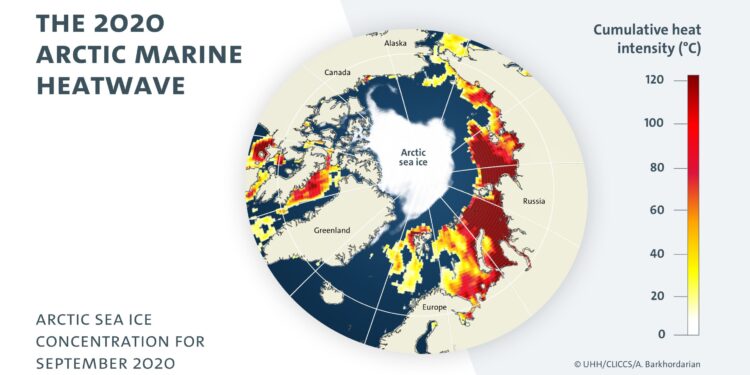The figure shows the most powerful heatwave in the Arctic Ocean so far in 2020, which continued for 103 days. The cumulative thermal intensity summarizes in degrees Celsius the daily water temperature anomalies recorded during the duration of the heatwave. Credit: UHH/CLICCS/A. Barkhordarian
Marine heatwaves will become commonplace in the Arctic in the near future and are the product of higher anthropogenic greenhouse gas emissions, according to a recently published study by Dr. Armineh Barkhordarian of the Pole of Excellence for Climate Change. CLICCS climate research at the University of Hamburg.
Since 2007, conditions in the Arctic have changed, as confirmed by data recently published in the journal Earth and Environment Communications. Between 2007 and 2021, marginal areas of the Arctic Ocean experienced 11 marine heatwaves, producing an average temperature increase of 2.2 degrees Celsius above the seasonal normal and lasting an average of 37 days. Since 2015, marine heatwaves have occurred annually in the Arctic.
The most powerful heatwave ever recorded in the Arctic Ocean occurred in 2020; it continued for 103 days, with maximum temperatures four degrees Celsius higher than the long-term average. The probability of such a heat wave occurring without the influence of anthropogenic greenhouse gases is less than 1%, according to calculations by Barkhordarian’s team from the CLICCS center of excellence. In doing so, they have reduced the number of plausible climate scenarios in the Arctic. According to the study, annual marine heatwaves will be the norm.
The Arctic has entered a new phase
In his study, Barkhordarian also proves for the first time that heat waves occur when sea ice melts early and quickly after winter. When this happens, considerable thermal energy can build up in the water by the time maximum solar radiation is reached in July.
“In 2007, a new phase began in the Arctic,” says Barkhordarian, an expert in climate statistics. “There is less and less thicker ice that is several years old, while the percentage of thin, seasonal ice is constantly increasing.” However, thin ice is less durable and melts more quickly, allowing incoming solar radiation to warm the water surface.
Officially, we speak of a marine heatwave when water surface temperatures are higher than 95% of the values of the last 30 years for at least five consecutive days.
“Not only the continued loss of sea ice, but also warming waters can have dramatic negative effects on the Arctic ecosystem,” says Barkhordarian. Food chains could collapse, fish stocks could decline and overall biodiversity could decline.
More information:
Arctic marine heat waves caused by greenhouse gases and triggered by the sudden melting of sea ice, Earth and Environment Communications (2024). DOI: 10.1038/s43247-024-01215-y
Provided by the University of Hamburg
Quote: Frequent marine heatwaves in the Arctic Ocean will be the norm, says new study (February 13, 2024) retrieved February 13, 2024 from
This document is subject to copyright. Apart from fair use for private study or research purposes, no part may be reproduced without written permission. The content is provided for information only.



